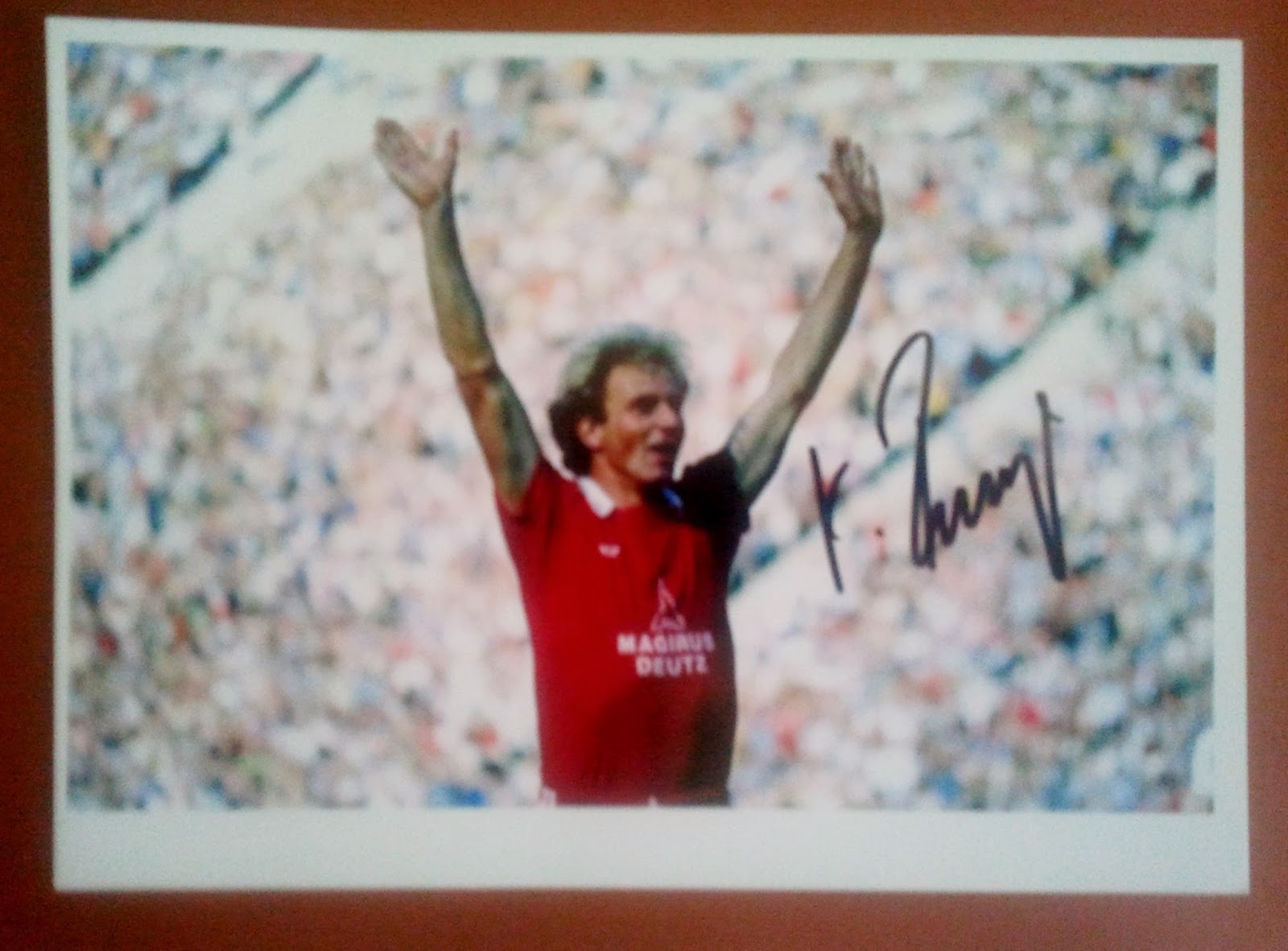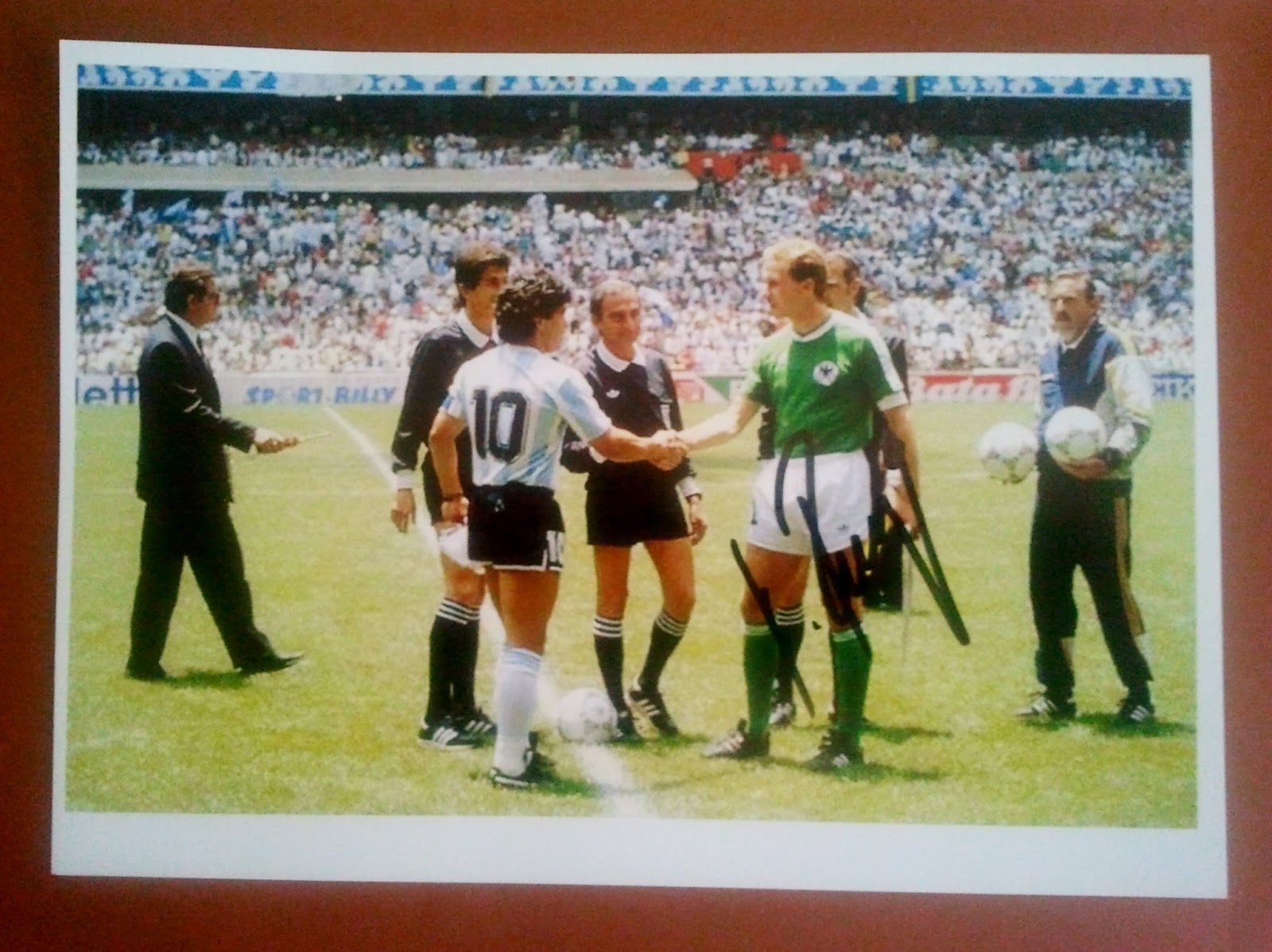 Karl-Heinz "Kalle" Rummenigge (born 25 September 1955 in Lippstadt) is a German former football striker.
Karl-Heinz "Kalle" Rummenigge (born 25 September 1955 in Lippstadt) is a German former football striker.He had his greatest career success with German club Bayern Munich, where he won the Intercontinental Cup, the European Cup, as well as two league titles and two domestic cups.
A member of the West Germany national team, Rummenigge won the 1980 European Championship and was part of the squad that finished runner-up in the 1982 FIFA World Cup and at the 1986 World Cup. He was also honoured twice as European Footballer of the Year.
He is currently the chief executive officer of the FC Bayern München AG, a daughter company of Bundesliga team Bayern Munich, as well as being the acting chairman of the European Club Association.
 Rummenigge was born in Lippstadt, North Rhine-Westphalia.
Rummenigge was born in Lippstadt, North Rhine-Westphalia.He joined Bayern Munich in 1974, coming from the Westphalian amateur side Borussia Lippstadt, for a transfer fee of ca. €10,000. He immediately showed great strength as a dribbler. His striking qualities were initially insignificant, but would find great improvement in later years, particularly after the arrival of coach Pal Csernai in 1979. In 1979–80, he scored 26 goals and became for the first time the Bundesliga's top striker, a feat he could repeat in 1981 and 1984 with 29 and 26 goals, respectively.
Rummenigge in his youth
 With Bayern he won the European Cup in 1975 and 1976. In 1975,
he did not take part in the final of the competition, whilst in the
year thereafter a glass of brandy sufficiently prepared the nervous
Rummenigge to contribute to the defeat of AS Saint-Etienne. In the same year he became also part of the team that prevailed in the Intercontinental Cup finals against Cruzeiro EC from Belo Horizonte.
With Bayern he won the European Cup in 1975 and 1976. In 1975,
he did not take part in the final of the competition, whilst in the
year thereafter a glass of brandy sufficiently prepared the nervous
Rummenigge to contribute to the defeat of AS Saint-Etienne. In the same year he became also part of the team that prevailed in the Intercontinental Cup finals against Cruzeiro EC from Belo Horizonte.In the era of coach Csernai he found in midfielder Paul Breitner a congenial partner and he formed such a formidable one-two-punch that they were only called Breitnigge (name invented by German newspaper Bild).
 The club, then often dubbed as "FC Breitnigge", won in this period the Bundesliga title in 1980 and 1981, and the DFB-Pokal in 1982 and 1984. A renewed triumph in the European Cup was denied, when the club lost the 1982 final narrowly against Aston Villa. In the season before Rummenigge was top-scorer in this competition with 6 goals.
The club, then often dubbed as "FC Breitnigge", won in this period the Bundesliga title in 1980 and 1981, and the DFB-Pokal in 1982 and 1984. A renewed triumph in the European Cup was denied, when the club lost the 1982 final narrowly against Aston Villa. In the season before Rummenigge was top-scorer in this competition with 6 goals.His substantial contribution to the successes of the club and the German national football team found also expression in personal honours. In 1980, he was named German Footballer of the Year and in '80–81 the European Footballer of the Year.
 In 1984, aged 29, he was sold for a record fee of €5.7m to Internazionale. Despite a notable beginning, in which he helped the team to compete until the end for the 1984–85 Scudetto, Rumenigge's career in Italy was mostly marred by injury problems. At the end of his contract in 1987, Rummenigge moved on to Swiss first division club Servette FC in Geneva, where he saw his career out. In his last season, 1988–89, he had his last success, becoming top scorer in the Swiss league with 24 goals.
In 1984, aged 29, he was sold for a record fee of €5.7m to Internazionale. Despite a notable beginning, in which he helped the team to compete until the end for the 1984–85 Scudetto, Rumenigge's career in Italy was mostly marred by injury problems. At the end of his contract in 1987, Rummenigge moved on to Swiss first division club Servette FC in Geneva, where he saw his career out. In his last season, 1988–89, he had his last success, becoming top scorer in the Swiss league with 24 goals.With the West German national team he took part in the 1978 FIFA World Cup, 1982 FIFA World Cup and 1986 FIFA World Cup. In 1978, West Germany exited in the second group stage of the tournament. In 1982 and 1986, the team was runner-up behind Italy and Argentina.
 Rummenigge also took part in two European Championship tournaments. In the 1980 competition in Italy, West Germany defeated Belgium in the final by 2–1 and won the trophy. The 1984
tournament is engraved as one of the most unsuccessful undertakings of
the German national team. West Germany was already ousted in the group
stage.
Rummenigge also took part in two European Championship tournaments. In the 1980 competition in Italy, West Germany defeated Belgium in the final by 2–1 and won the trophy. The 1984
tournament is engraved as one of the most unsuccessful undertakings of
the German national team. West Germany was already ousted in the group
stage. From 1990 until 1994 Rummenigge worked as a TV co–commentator for
matches of the German national team. In autumn 1991, Bayern Munich
invited Franz Beckenbauer
and Rummenigge to return to the club as vice presidents. Rummenigge
held this position until 2002, when he was appointed Chairman of
Executive Board of the newly corporatised football department of the
club. According to the club, "in his role as chairman he is responsible
for external relations, new media, board affairs and representing the
holding company on national and international bodies."
From 1990 until 1994 Rummenigge worked as a TV co–commentator for
matches of the German national team. In autumn 1991, Bayern Munich
invited Franz Beckenbauer
and Rummenigge to return to the club as vice presidents. Rummenigge
held this position until 2002, when he was appointed Chairman of
Executive Board of the newly corporatised football department of the
club. According to the club, "in his role as chairman he is responsible
for external relations, new media, board affairs and representing the
holding company on national and international bodies." 
In April 1983, the British pop duo Alan & Denise recorded a tribute song about his "sexy knees" in the song "Rummenigge, what a man". The record reached number 43 in German charts.
In March 2004 he was named by Pelé as one of the top 125 greatest living footballers.
His brother Michael Rummenigge was also a noteworthy footballer. He played as forward for Bayern Munich and Borussia Dortmund from 1982–88 and 1988–94, respectively. He also represented Germany on two occasions between 1983 and 1986.
Rumenigge and his wife Martina have three sons and two daughters born between 1980 and 1991.
- He is the eleventh most capped player for Germany (inclusive of three East German Players)
- He is the fifth most successful striker for Germany (inclusive one East German player)
- He is the tenth most prolific scorer of all time in Bundesliga history
- With Bayern Munich he is the second most prolific scorer of all time in league history after Gerd Müller

Karl-Heinz Rummenigge (n. 25 septembrie 1955 în Lippstadt) este un fost jucător de fotbal german.
Cel mai mare succes l-a avut la clubul german Bayern München cu care a câștigat Cupa Intercontinentală, Liga Campionilor, două campionate și două cupe.
A fost în Echipa națională de fotbal a Germaniei cu care a câștigat Campionatul European de Fotbal din 1980 și a făcut parte din echipele care au terminat pe locul doi la Campionatul Mondial de Fotbal din 1982 și la Campionatul Mondial de Fotbal din 1986. A primit de două ori Balonul de Aur.